Tim Atkinson's Blog, page 32
August 12, 2016
Happy Left-Handed Day!
Yes, in a world whew there's a day for everything, today really is World Left-Handed Day.
As a life-long south paw, along with Barack Obama (and a host of other US Presidents) I'm more than happy to post something positive about our much maligned preference.
Even the word 'left' in many languages leaves a lot to be desired - 'gauche' (French) and 'sinestra' (Latin) imply clumsiness and worse, while
And why do we wear our wedding rings on our left hand? Why, to ward off the evil that might otherwise blight our nuptial bliss.
Being left-handed isn't easy, but at least as we smudge the ink on life's page we can count ourselves in good company. So, raise a glass (in your left-hand) to the one in ten of us who do it - write, pitch, bat, bowl, serve, return, tee off and think - differently. Lefties, we're in good company...
Aristotle Leonardo da VinciMarie CurieNeil ArmstrongPele...
And many more.
As a life-long south paw, along with Barack Obama (and a host of other US Presidents) I'm more than happy to post something positive about our much maligned preference.
Even the word 'left' in many languages leaves a lot to be desired - 'gauche' (French) and 'sinestra' (Latin) imply clumsiness and worse, while
And why do we wear our wedding rings on our left hand? Why, to ward off the evil that might otherwise blight our nuptial bliss.
Being left-handed isn't easy, but at least as we smudge the ink on life's page we can count ourselves in good company. So, raise a glass (in your left-hand) to the one in ten of us who do it - write, pitch, bat, bowl, serve, return, tee off and think - differently. Lefties, we're in good company...
Aristotle Leonardo da VinciMarie CurieNeil ArmstrongPele...
And many more.
Published on August 12, 2016 21:33
August 4, 2016
Banks of Green Willow
Today marks the centenary of the death on the Somme of one of this country's most promising composers. I've written about George Butterworth before, most recently when we went on our own pilgrimage to Thiepval, where his is one of the 'intolerably nameless names' of those with no known grave commemorated on that huge memorial.
I'd always planned to post something today, to mark another of the many sad anniversaries. But then I came across this, a short film by the Commonwealth War Graves Commission. I can do no better...
I'd always planned to post something today, to mark another of the many sad anniversaries. But then I came across this, a short film by the Commonwealth War Graves Commission. I can do no better...
Published on August 04, 2016 16:00
July 27, 2016
All the nice girls...
... love a soldier.
Don't they?
(Or should that be a sailor?)
Never mind.
I never thought publishing fiction would be easy. Far from it. But I must admit I didn't anticipate having to do this...

So, if you see me dressed thus this summer, playing World War One trench songs and handing out postcards, do please take one, take a look and maybe make a pledge for my novel, The Glorious Dead, currently being crowdfunded by award-winning innovative imprint, Unbound.
Thanks!
Don't they?
(Or should that be a sailor?)
Never mind.
I never thought publishing fiction would be easy. Far from it. But I must admit I didn't anticipate having to do this...

So, if you see me dressed thus this summer, playing World War One trench songs and handing out postcards, do please take one, take a look and maybe make a pledge for my novel, The Glorious Dead, currently being crowdfunded by award-winning innovative imprint, Unbound.
Thanks!
Published on July 27, 2016 00:00
July 22, 2016
Hello Dickies!
Doing a good job is about having the right gear. Wouldn't you feel better doing those little jobs around the house and in the garden if you had the right tools and - crucially - the right clothes?
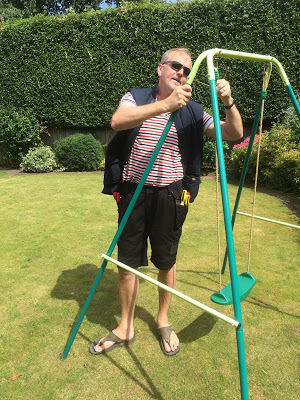
Now, the job I do doesn't really require anything special by way of clothing. There's no uniform, no dress code, nothing. In fact, I could probably wear nothing (and sometimes do) and it wouldn't matter. (I'm talking, dear reader, about my tenuous hold on the career of writer rather than my former life as a schoolteacher. Obviously!)
Anyway, I might not do a job that requires specialist clothing but I do plenty of jobs that do - little jobs around the house (and jobs around the little house) and so when Dickies Workwear invited me to try a couple of items from their range, I jumped at the chance.
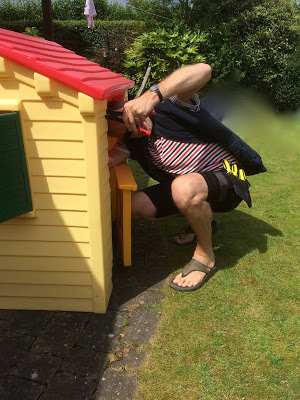
First up, shorts. Eisenhower Premium shorts, to be precise. With zip off, angled holster pockets reinforced with Cordura® as well as regular pockets, 2 back pockets reinforced with Cordura® there's plenty of places for tools, which means that they're there where you need them, when you want them.
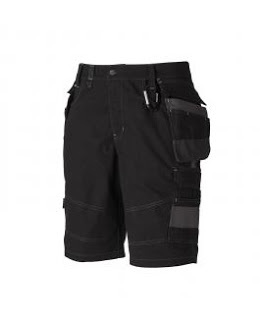
They're tough, too. Made of 65% polyester, 35% cotton ripstop with Teflon coating, they're certainly up to the job. Pretty much any job.
And then there's the rather elegant Professional Combat Bodywarmer...

This rather stylish, zip fronted (with velcro fastened storm flap) sleeveless jacket has a mobile phone pocket (again, with velcro fastening), pen pocket and generous waist pockets too. Again, the resilient 65% polyester, 35% cotton twill fabric (with water repellent finish) will keep you warm as well as well provided for.
Both are available from the Dickies Workwear website (along with the entire range of outerwear, trousers, footwear and safety clothing) and come highly recommended.

Now, the job I do doesn't really require anything special by way of clothing. There's no uniform, no dress code, nothing. In fact, I could probably wear nothing (and sometimes do) and it wouldn't matter. (I'm talking, dear reader, about my tenuous hold on the career of writer rather than my former life as a schoolteacher. Obviously!)
Anyway, I might not do a job that requires specialist clothing but I do plenty of jobs that do - little jobs around the house (and jobs around the little house) and so when Dickies Workwear invited me to try a couple of items from their range, I jumped at the chance.

First up, shorts. Eisenhower Premium shorts, to be precise. With zip off, angled holster pockets reinforced with Cordura® as well as regular pockets, 2 back pockets reinforced with Cordura® there's plenty of places for tools, which means that they're there where you need them, when you want them.

They're tough, too. Made of 65% polyester, 35% cotton ripstop with Teflon coating, they're certainly up to the job. Pretty much any job.
And then there's the rather elegant Professional Combat Bodywarmer...

This rather stylish, zip fronted (with velcro fastened storm flap) sleeveless jacket has a mobile phone pocket (again, with velcro fastening), pen pocket and generous waist pockets too. Again, the resilient 65% polyester, 35% cotton twill fabric (with water repellent finish) will keep you warm as well as well provided for.
Both are available from the Dickies Workwear website (along with the entire range of outerwear, trousers, footwear and safety clothing) and come highly recommended.
Published on July 22, 2016 23:30
Dickies Workwear Eisenhower Premium Shorts Professional Combat Bodywarmer.
Doing a good job is about having the right gear. Wouldn't you feel better doing those little jobs around the house and in the garden if you had the right tools and - crucially - the right clothes?

Now, the job I do doesn't really require anything special by way of clothing. There's no uniform, no dress code, nothing. In fact, I could probably wear nothing (and sometimes do) and it wouldn't matter. (I'm talking, dear reader, about my tenuous hold on the career of writer rather than my former life as a schoolteacher. Obviously!)
Anyway, I might not do a job that requires specialist clothing but I do plenty of jobs that do - little jobs around the house (and jobs around the little house) and so when Dickies Workwear invited me to try a couple of items from their range, I jumped at the chance.

First up, shorts. Eisenhower Premium shorts, to be precise. With zip off, angled holster pockets reinforced with Cordura® as well as regular pockets, 2 back pockets reinforced with Cordura® there's plenty of places for tools, which means that they're there where you need them, when you want them.

They're tough, too. Made of 65% polyester, 35% cotton ripstop with Teflon coating, they're certainly up to the job. Pretty much any job.
And then there's the rather elegant Professional Combat Bodywarmer...

This rather stylish, zip fronted (with velcro fastened storm flap) sleeveless jacket has a mobile phone pocket (again, with velcro fastening), pen pocket and generous waist pockets too. Again, the resilient 65% polyester, 35% cotton twill fabric (with water repellent finish) will keep you warm as well as well provided for.
Both are available from the Dickies Workwear website (along with the entire range of outerwear, trousers, footwear and safety clothing) and come highly recommended.

Now, the job I do doesn't really require anything special by way of clothing. There's no uniform, no dress code, nothing. In fact, I could probably wear nothing (and sometimes do) and it wouldn't matter. (I'm talking, dear reader, about my tenuous hold on the career of writer rather than my former life as a schoolteacher. Obviously!)
Anyway, I might not do a job that requires specialist clothing but I do plenty of jobs that do - little jobs around the house (and jobs around the little house) and so when Dickies Workwear invited me to try a couple of items from their range, I jumped at the chance.

First up, shorts. Eisenhower Premium shorts, to be precise. With zip off, angled holster pockets reinforced with Cordura® as well as regular pockets, 2 back pockets reinforced with Cordura® there's plenty of places for tools, which means that they're there where you need them, when you want them.

They're tough, too. Made of 65% polyester, 35% cotton ripstop with Teflon coating, they're certainly up to the job. Pretty much any job.
And then there's the rather elegant Professional Combat Bodywarmer...

This rather stylish, zip fronted (with velcro fastened storm flap) sleeveless jacket has a mobile phone pocket (again, with velcro fastening), pen pocket and generous waist pockets too. Again, the resilient 65% polyester, 35% cotton twill fabric (with water repellent finish) will keep you warm as well as well provided for.
Both are available from the Dickies Workwear website (along with the entire range of outerwear, trousers, footwear and safety clothing) and come highly recommended.
Published on July 22, 2016 23:30
July 20, 2016
The Last Day of World War One
That was the title of an excellent documentary shown on Monday night, presented by Michael Palin, about the men who died - and continued to die - after the 1918 Armistice.
It's been on before and I saw it first time round. But it still makes fascinating viewing. It's this hinterland of Great War history - the margins, peripheries and hidden corners - that fascinates me. It's what led me to research and write about the great forgotten army, the men who continued to serve their King and country on the Western Front for up to three years after the 1918 armistice... finding and burying bodies. And slowly rebuilding their own lives.
It's a little-known fact that a further 863 Commonwealth soldiers died on the last day of the Great War, many of them hours after the Armistice had been signed - but before, of course, the hour at which it was decreed that the fighting should be stopped.
The hopelessness of the German cause - following the failure of the Spring offensive - had probably been apparent for four or five months, from when the tide turned in July on the River Marne. Subsequent Allied offensives, starting with the British attack at Amiens on August 8th, virtually destroyed the German army. Back home, the Allied naval blockade was slowly destroying Germany. And then, of course, the Americans arrived. Although US involvement wasn't altogether effective (due to failures by their commanding officers - where have we heard that before?) the writing, for the 14-18 conflict, was already on the wall.
So why did so many men still have to die? Why did the fighting go on for so long?
The answer is depressingly familiar and has a very topical ring - politics, specifically the wrangling of politicians failing to agree the terms of what they knew was coming.
But even when the ink was eventually dry and the document was sealed, the killing continued. On the morning of November 11th itself, news of the Armistice reached Britain in time for the late editions of the daily newspapers. There was cheering in the streets and bells were rung hours before the eleventh hour. But men were still being sent over the top and into battle.
For what?
It's no secret that the US General John Pershing was unhappy with the terms of the Armistice, believing that the Germans wouldn't regard themselves as beaten and that 'we'll have to do it all again someday...' Prophetic words. And there are tales of newly-liberated Belgian civilians urging Allied soldiers on with shouts of 'Berlin! Berlin! La guerre ne pas finis!'
But by then the damage was done, the Armistice signed and the clock was ticking.
But the guns kept firing.
You can watch the programme for the next 28 days on BBC iPlayer. If, like me, what interests you about military history - or history in general - in not the highways but the by-ways, I'm sure you'll enjoy it. If what interests you is reading about a long-neglected by-way of history brought to life through fiction, then you might even like to consider pledging for my book, The Glorious Dead. You can find out all about it here: https://unbound.com/books/the-gloriou...

It's been on before and I saw it first time round. But it still makes fascinating viewing. It's this hinterland of Great War history - the margins, peripheries and hidden corners - that fascinates me. It's what led me to research and write about the great forgotten army, the men who continued to serve their King and country on the Western Front for up to three years after the 1918 armistice... finding and burying bodies. And slowly rebuilding their own lives.
It's a little-known fact that a further 863 Commonwealth soldiers died on the last day of the Great War, many of them hours after the Armistice had been signed - but before, of course, the hour at which it was decreed that the fighting should be stopped.
The hopelessness of the German cause - following the failure of the Spring offensive - had probably been apparent for four or five months, from when the tide turned in July on the River Marne. Subsequent Allied offensives, starting with the British attack at Amiens on August 8th, virtually destroyed the German army. Back home, the Allied naval blockade was slowly destroying Germany. And then, of course, the Americans arrived. Although US involvement wasn't altogether effective (due to failures by their commanding officers - where have we heard that before?) the writing, for the 14-18 conflict, was already on the wall.
So why did so many men still have to die? Why did the fighting go on for so long?
The answer is depressingly familiar and has a very topical ring - politics, specifically the wrangling of politicians failing to agree the terms of what they knew was coming.
But even when the ink was eventually dry and the document was sealed, the killing continued. On the morning of November 11th itself, news of the Armistice reached Britain in time for the late editions of the daily newspapers. There was cheering in the streets and bells were rung hours before the eleventh hour. But men were still being sent over the top and into battle.
For what?
It's no secret that the US General John Pershing was unhappy with the terms of the Armistice, believing that the Germans wouldn't regard themselves as beaten and that 'we'll have to do it all again someday...' Prophetic words. And there are tales of newly-liberated Belgian civilians urging Allied soldiers on with shouts of 'Berlin! Berlin! La guerre ne pas finis!'
But by then the damage was done, the Armistice signed and the clock was ticking.
But the guns kept firing.
You can watch the programme for the next 28 days on BBC iPlayer. If, like me, what interests you about military history - or history in general - in not the highways but the by-ways, I'm sure you'll enjoy it. If what interests you is reading about a long-neglected by-way of history brought to life through fiction, then you might even like to consider pledging for my book, The Glorious Dead. You can find out all about it here: https://unbound.com/books/the-gloriou...

Published on July 20, 2016 03:00
July 5, 2016
Pugh, Pugh, Barney MacGrew, Cuthbert, Dibble, Grub
And not 'and' Grub, either. A mistake even the Telegraph obituarist made the other day in his oration for the gentle genius that was Gordon Murray.
Yes, in case you missed it among the confounded noise from Westminster or Wimbledon (or Wales!) that wonderful, whimsical story-teller and puppeteer Gordon Murray died last week.
Responsible for such timeless gems as Trumpton, Chigley and Camberwick Green, Murray and his made-up worlds were part of the lives of many more children than even the massed ranks watching wall-to-wall CBeebies nowadays.
Because, back then, fifteen minutes following the lunchtime news (or before the six o'clock bulletin) was all you'd get. So it had to be good. And they were. Crafted and polished like poetry, and with hidden depths that meant that even though there were only about a dozen episodes of each series, you could watch them again and again and see something new.
I heard Murray interviewed a few years ago. Apart from being dismayed by the disclosure that he'd burnt all the puppets (which was nothing short of an act of vandalism) I was struck by his great sadness.
He explained his motivation in creating the puppet worlds he was so famous for. 'Childhood is all we've got,' he said, 'to sustain us as adults. And I'm so very sad that these days, childhood so very short. I hope I helped make it last a little longer.'

Yes, in case you missed it among the confounded noise from Westminster or Wimbledon (or Wales!) that wonderful, whimsical story-teller and puppeteer Gordon Murray died last week.
Responsible for such timeless gems as Trumpton, Chigley and Camberwick Green, Murray and his made-up worlds were part of the lives of many more children than even the massed ranks watching wall-to-wall CBeebies nowadays.
Because, back then, fifteen minutes following the lunchtime news (or before the six o'clock bulletin) was all you'd get. So it had to be good. And they were. Crafted and polished like poetry, and with hidden depths that meant that even though there were only about a dozen episodes of each series, you could watch them again and again and see something new.
I heard Murray interviewed a few years ago. Apart from being dismayed by the disclosure that he'd burnt all the puppets (which was nothing short of an act of vandalism) I was struck by his great sadness.
He explained his motivation in creating the puppet worlds he was so famous for. 'Childhood is all we've got,' he said, 'to sustain us as adults. And I'm so very sad that these days, childhood so very short. I hope I helped make it last a little longer.'

Published on July 05, 2016 02:41
June 30, 2016
The lads in their hundreds...
As a subject, The Somme is huge, as immense as the Thiepval monument to the 72,000 missing, men who in many cases met their deaths within minutes of the start of the slaughter, fodder for the German guns, caught on German wire, or atomised by artillery bombardments.

There's hardly any more to be said. Words fail and figures speak for themselves.
20,000 British and Empire dead on day one
100,000 troops sent into battle along a fifteen mile front
A seven day preliminary bombardment designed to destroy German defences, firing 1.7 million shells
625,000 Allied casualties in total; an estimated half a million German dead and injured
The almost total destruction of both the Newfoundland Regiment and the 10th West Yorks.
Best, then, on the awful anniversary of Britain's bloodiest battle, to perhaps do what we did on our visit to Thiepval a few weeks ago - to concentrate on someone, an individual, to think about them, find out a little about them in an attempt to make the massive massacre mean something, to better comprehend the incomprehensible.
So, to mark the anniversary, I'll be listening, playing and singing the music of this man - George Butterworth, MC.
Here he is, among those 'intolerably nameless names' on that huge monolith.
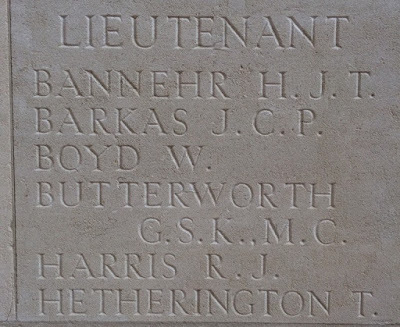
He died, aged 31 on 5th August 1916, after leading his men of the 13th Durham Light Infantry in a successful assault of Munster Alley. Prior to the war he was a composer of immense promise. Here's an example of his music, a more appropriate - and eerily prescient - tribute is hard to imagine...
They carry back bright to the coiner the mintage of man,
The lads who will die in their glory and never be old.
(A.E.Housman)

There's hardly any more to be said. Words fail and figures speak for themselves.
20,000 British and Empire dead on day one
100,000 troops sent into battle along a fifteen mile front
A seven day preliminary bombardment designed to destroy German defences, firing 1.7 million shells
625,000 Allied casualties in total; an estimated half a million German dead and injured
The almost total destruction of both the Newfoundland Regiment and the 10th West Yorks.
Best, then, on the awful anniversary of Britain's bloodiest battle, to perhaps do what we did on our visit to Thiepval a few weeks ago - to concentrate on someone, an individual, to think about them, find out a little about them in an attempt to make the massive massacre mean something, to better comprehend the incomprehensible.
So, to mark the anniversary, I'll be listening, playing and singing the music of this man - George Butterworth, MC.
Here he is, among those 'intolerably nameless names' on that huge monolith.

He died, aged 31 on 5th August 1916, after leading his men of the 13th Durham Light Infantry in a successful assault of Munster Alley. Prior to the war he was a composer of immense promise. Here's an example of his music, a more appropriate - and eerily prescient - tribute is hard to imagine...
They carry back bright to the coiner the mintage of man,
The lads who will die in their glory and never be old.
(A.E.Housman)
Published on June 30, 2016 10:45
June 28, 2016
Happy families
Scene: the dining room, supper time. Spag. bol. is being consumed.
Cast: Eloise (5), Mummy, Daddy, Sally, Charlie.
Eloise: Mummy, when I get married and have a baby, you'll be its granny.
Mummy: Yes, darling. That's right.
Eloise: And daddy, you'll be its grandad.
Daddy: (mouth full of spaghetti) mmm....
Eloise (to Charlie, and Sally): And you'll be the uncle, and you'll be the auntie.
(They nod, sucking up spaghetti)
Eloise: Yes, and the person I marry will be the daddy. (Pause) Or the other mummy.
Cast: Eloise (5), Mummy, Daddy, Sally, Charlie.
Eloise: Mummy, when I get married and have a baby, you'll be its granny.
Mummy: Yes, darling. That's right.
Eloise: And daddy, you'll be its grandad.
Daddy: (mouth full of spaghetti) mmm....
Eloise (to Charlie, and Sally): And you'll be the uncle, and you'll be the auntie.
(They nod, sucking up spaghetti)
Eloise: Yes, and the person I marry will be the daddy. (Pause) Or the other mummy.
Published on June 28, 2016 02:34
June 22, 2016
Unknown on Unbound
It's not easy as a relative unknown on Unbound. Although there are a few of us on the site, there are plenty more Unbound authors who come to crowdfunding with an armful of loyal readers or viewers or fans. (Terry 'He's not The Messiah' Jones, Raymond 'The Snowman' Briggs to name but two. You get the picture.)
What this seems to mean so far is this: the majority of people who have supported my book seem to know me in some way. They're friends, family, colleagues, ex-students, acquaintances and so on. Some - blog readers, for instance, or that select group of fans of my first novel - know, or have a reasonable expectation, of what they're getting by way of my writing (or they hope they do!). Others - an increasing number of strangers, unfamiliar names on the supporters list - are taking a chance on the strength of the extract they can read on the Unbound website, or the video introduction.
As things stand I need a further 273 more pledges to get The Glorious Dead published. That sounds a lot, but if there aren't at least 273 people out there who are interested enough in the subject and keen enough on the project to take a punt on it then I'll happily eat one of the war medals I'm offering as a rewards for one of the pledges.
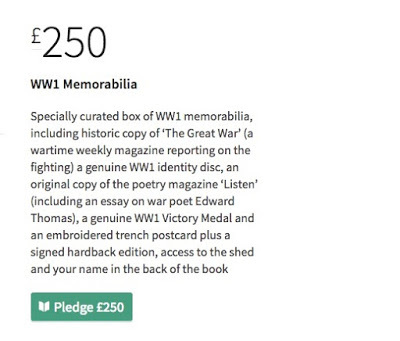
It's finding these people that is going to be the next challenge.
And that is where you come in. Because it seems reasonable, given that so many, so far, of the supporters are people I know that they - you - might be able to enlist the help of the remaining 273 subscribers that the book needs. You know me, know my writing, know how passionate I am about this subject and how desperate I am to tell the forgotten story of the soldiers who stayed in France and Flanders, finding bodies and digging graves and rebuilding lives shattered by the Great War.
I reckon if everyone who has pledged so far or everyone who reads this post could put in a good word with someone else we'd be up and running in no time. So if you can think of someone please consider telling them. Let word-of-mouth be my marketing. And let's hope that, before too long, it's no longer a case of 'unknown' on Unbound - but unleashed!
If you'd like to find out more about my novel The Glorious Dead and perhaps support its publication, please click here: https://unbound.co.uk/books/the-glorious-dead
What this seems to mean so far is this: the majority of people who have supported my book seem to know me in some way. They're friends, family, colleagues, ex-students, acquaintances and so on. Some - blog readers, for instance, or that select group of fans of my first novel - know, or have a reasonable expectation, of what they're getting by way of my writing (or they hope they do!). Others - an increasing number of strangers, unfamiliar names on the supporters list - are taking a chance on the strength of the extract they can read on the Unbound website, or the video introduction.
As things stand I need a further 273 more pledges to get The Glorious Dead published. That sounds a lot, but if there aren't at least 273 people out there who are interested enough in the subject and keen enough on the project to take a punt on it then I'll happily eat one of the war medals I'm offering as a rewards for one of the pledges.

It's finding these people that is going to be the next challenge.
And that is where you come in. Because it seems reasonable, given that so many, so far, of the supporters are people I know that they - you - might be able to enlist the help of the remaining 273 subscribers that the book needs. You know me, know my writing, know how passionate I am about this subject and how desperate I am to tell the forgotten story of the soldiers who stayed in France and Flanders, finding bodies and digging graves and rebuilding lives shattered by the Great War.
I reckon if everyone who has pledged so far or everyone who reads this post could put in a good word with someone else we'd be up and running in no time. So if you can think of someone please consider telling them. Let word-of-mouth be my marketing. And let's hope that, before too long, it's no longer a case of 'unknown' on Unbound - but unleashed!
If you'd like to find out more about my novel The Glorious Dead and perhaps support its publication, please click here: https://unbound.co.uk/books/the-glorious-dead
Published on June 22, 2016 05:14



